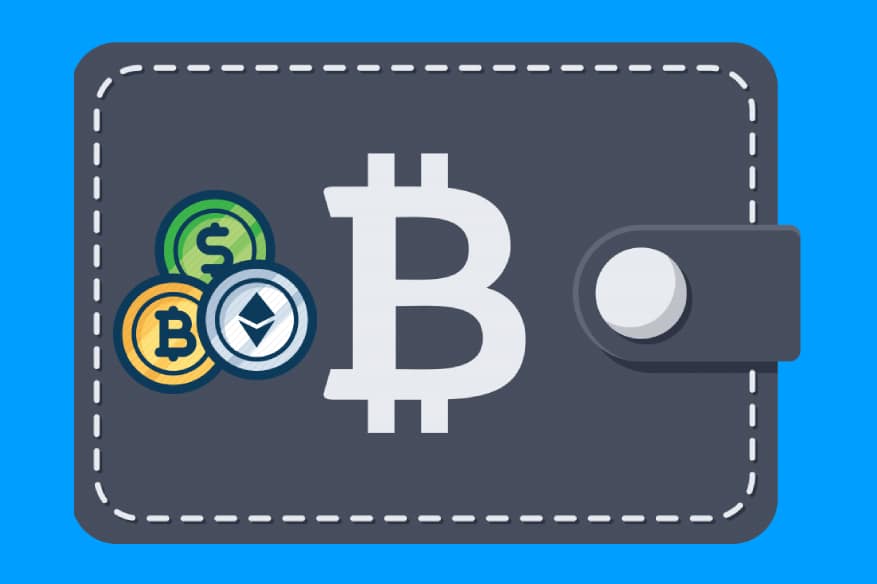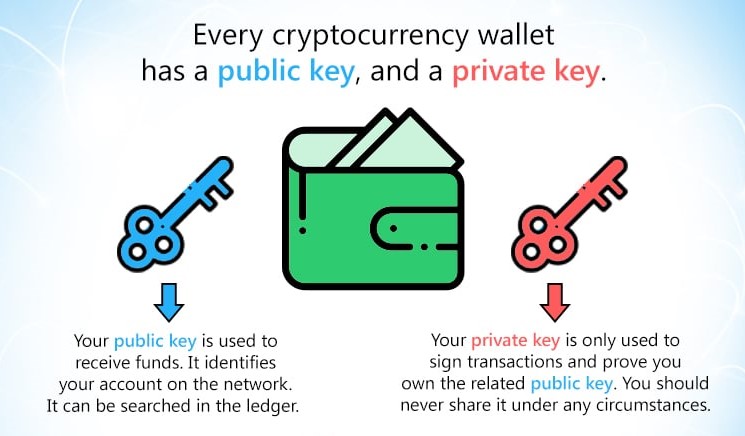
How do you store your real-world cash? Do you hold it in your hands?
No, you may use a leather wallet or a purse or a piggy bank to store your money. Ultimately, you store it in a safe and secure place. Similarly, cryptocurrency wallets also store your valuable money in the form of digital assets. These cryptocurrency wallets allow you to send and receive Bitcoins and other cryptocurrencies.
Let’s understand more about cryptocurrency wallets to know its working, the types of wallets, and much more.
What are cryptocurrency wallets?

A cryptocurrency wallet is a software program that stores the secret keys to digitally sign cryptocurrency transactions for distributed ledgers. These are the public and private keys that enable users to send and receive digital currency and analyze their balance. If you’re using a Bitcoin or any other cryptocurrency, then you need a digital wallet to store it.
The cryptocurrency wallets keep track of encryption keys used to digitally sign transactions. Also, it stores the address on a blockchain where an asset is present. If the owner loses the address, they will lose control over the currency of the asset.
Let’s understand how these cryptocurrency wallets work.
How do they work?
A cryptocurrency wallet is similar to your bank account number. In bank transfers, there is no harm in sharing your account number. It will be necessary to send and receive money to your account. In cryptocurrency transfers, you need to share your crypto wallet address.
No two wallet addresses will ever be the same. So, there are no chances that anyone else will get your funds. Also, you can create any number of wallet addresses. An example of a wallet address can be :-
1A1zP1eP5QGefi2DMPTfTL5SLmv7DivfNa
You can see that this wallet address is a combination of numbers and letters in both upper case and lower case. Blockchain is transparent, so you can see how much money a certain cryptocurrency wallet has and the transactions the owner has made previously. The cryptocurrency wallet does not reveal the real-world identity of the owner. So, it is referred to as “pseudonymous”.
Public Keys and Private Keys

Each cryptocurrency wallet address will have a unique private and public key. With private keys, you can access the funds related to the crypto wallet address. In bank transfers, when you want to send money from one bank account to another bank account, you have to enter your private password. No one has the access to this password, not even the bank.
A private key does the same job as it is linked to the specific individual’s crypto wallet address. A public key is mathematically linked to your crypto wallet address. It is a hashed version. A hash function enables a sequence of letters and/or numbers as input to be encrypted into a new set of letters and/or numbers as output. The hash function adds an extra layer of security to ensure that your wallet cannot be hacked.
Let’s see how the public and private keys look:
Private Key: 03bf350d283981058a608051e3e898e507f78fe2d2e8c774de4a9a7edecf74eda
Public Key: 99b1ebcfc11a13f56ghtd61aba8160460fe1601d541
These keys are specifically linked to each other. It proves that you are the owner of the coins and you can transfer them whenever you want. Using a cryptocurrency wallet is like using the internet to send emails.
Imagine walking into a store and paying for goods using a debit or credit card. You do not physically exchange money between you and the store. All you have to do is enter your private pin number, verify your funds, and move them from your account to the store account.
It is the same in the case of cryptocurrency wallets. You have to enter your private ket, verify that you own the coins, and then transfer it to someone else. Hence, you transfer the coins from one person to another.
Now, let’s understand various types of cryptocurrency wallets.
Different types of Cryptocurrency Wallets
There are various wallets in which you can store and access your digital currencies. These wallets can be categorized into software, hardware, and paper wallets. Software wallets are desktop, mobile or online wallets.
Desktop Wallet: You can download and install these wallets on your PC or laptops. You can access them only from that computer which you have downloaded. They offer the highest level of securities. But, if your computer gets hacked or gets a virus, then there is a chance of losing all your funds.
Online Wallets: These wallets are run on the cloud and you can access them from any computing device in any location. Although these wallets are convenient to access, they are controlled by a third party which makes them more vulnerable to hacking attacks and theft.
Mobile Wallets: These wallets run on an app on your phone and they can be used anywhere including the retail stores. These wallets require limited space so they are much smaller and simpler than desktop.
Hardware Wallets: The hardware wallets differ from the software wallets as they store user’s private keys on a hardware device like USB. The transactions on the hardware wallet are online, the currency stored is online. So the security in the hardware wallet is higher. Making transactions on the hardware wallet is easier as you have to simply plug in the device to any internet-enabled computer or device, enter a pin, send currency and confirm.
Paper Wallets: These wallets are a piece of software used to generate a pair of keys which are then printed. Cryptocurrency transfer to the paper wallet is obtained by the transfer of funds from your software wallet to the public address shown on your paper wallet. While withdrawing or spending currency, you have to transfer the funds from your paper wallet to your software wallet.
Final Word
Now that you know much about the cryptocurrency wallets, always choose the one that suits the best for you. Cryptocurrency wallets play a prominent role in the usage of cryptocurrencies. While choosing the wallets, understand your requirements and what the wallets can offer you. Only then choose the wallet.
Disclaimer: The information provided is not trading advice, Bitcoinworld.co.in holds no liability for any investments made based on the information provided on this page. We strongly recommend independent research and/or consultation with a qualified professional before making any investment decisions.

